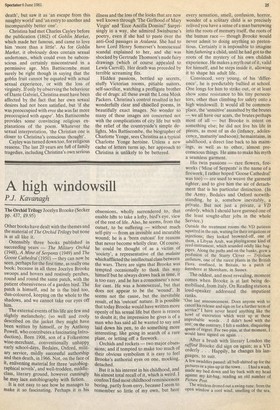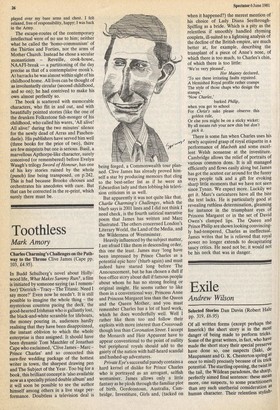A high windowsill
P.J. Kavanagh
The Orchid Trilogy Jocelyn Brooke (Seeker pp. 437, £9.95) Other books have dealt with the themes and the material of The Orchid Trilogy but none is at all like it.
Ostensibly three books published in succeeding years — The Military Orchid (1948), A Mine of Serpents (1949) and The Goose Cathedral (1950) — they can now be seen, perhaps for the first time, as really one book; because in all three Jocelyn Brooke swoops and hovers and restively perches, round and round the same patch, with the patient obsessiveness of a garden bird. The patch is himself, and he is the bird too, dun-coloured, keeping on the whole to the shadows, and we cannot take our eyes off him.
The external events of his life are few and slightly melancholy; (so well and cooly described on the jacket they might have been written by himself, or by Anthony Powell, who contributes a fascinating Introduction). Born 1908, son of a Folkestone wine-merchant, conventionally unhappy early school-days, Bedales, Oxford, military service, mildly successful authorship and then death, in 1966. Not, on the face of it, enlivening material for three 'aiitobiographical novels', and well-trodden, middleclass, literary ground, however cunningly he may lace autobiography with fiction.
It is not easy to see how he manages to make it so fascinating. Perhaps it is his obsessions, wholly surrendered to, that enable hiln to take a lofty, bird's eye, view of the rest of life. Also, he seems, from the outset, to be suffering — without much • self-pity — from an invisible and incurable wound; he is a 'born outcast' for reasons that never become wholly clear. Of course, he could be thought of as a victim of 'society', a representative of the malaise which afflicted the intellectual class between the wars. There are signs that Brooke was tempted occasionally to think this way himself but he always draws back in time, it is too easy, and he has a connoisseur's nose for cant. He was a homosexual, but that does not appear to be the 'wound'. It seems not the cause, but the inevitable result, of his 'outcast' nature. It is possible that today Brooke would have written more openly of his sexual life but there is reason to doubt it; the impression he gives is of a man who has said all he wanted to say and laid down his pen, to do something more interesting; like going in search of a rare plant, or letting off a firework.
Orchids and rockets — two major obsessions; and if tempted to make too much of their obvious symbolism it is easy to feel Brooke's authorial eyes on one, mocking, detached.
But it is his interest in his childhood, and his almost total recall of it, which is weird. I confess I find most childhood reminiscences boring, partly from envy, because I seem to remember so little of my own, but here every sensation, smell, confusion, horror, wonder of a solitary child is so precisely relived you have a sense of a man burrowing into the roots of memory itself, the roots of the human race — though Brooke would never admit to doing anything so pretentious. Certainly it is impossible to imagine him fathering a child, until he had got to the roots of the mystery of his own childish experience. He makes a myth out of it, valid for himself, and he steps inside it, allowing it to shape his adult life.
Convinced, very young, of his 'difference', he is predictably bullied at school. One longs for him to strike out, or at least show some resistance to his tiny persecutors, other than climbing for safety onto a high windowsill. It would all be commonplace, the 'sensitive' assaulted by the brutes — we all have our scars, the brutes perhaps most of all — but Brooke is intent on something else; he did not live his life in pieces, as most of us do (infancy, adolescence,'maturity' and soon); he maintains, in adulthood, a direct line back to his maimings, as well as to other, almost preconscious things. He aims to make his myth a seamless garment.
His twin passions — rare flowers, fireworks ('Mine of Serpents' is the name of a firework, I rather hoped 'Goose Cathedral' was too) — are used to weave the garment tighter, and to give him the air of detachment that is his particular distinction. (In the Army, Bedales and Oxford notwithstanding, he is, somehow inevitably, a private. But not just a private, a VD orderly, which I should have guessed one of the least sought-after jobs in the whole Service.) Outside the treatment rooms the VD patients squatted in the sun, waiting for their irrigations or injections; they looked browned-off, one of them, a Libyan Arab, was playingsome kind of reed-instrument, which sounded oddly like bagpipes. Along the paths and on the banks, grew a profusion of the Starry Clover — Trifolium stellatum, one of the rarest plants in the British Flora, confined, in Britain, to a patch of foreshore at Shoreham, in Sussex.
The oddest, and most revealing, moment comes when Brooke is at last being demobilised, from Italy. On Reading station a loud-speaker addressed the impatient ranks.
'One last announcement. Does anyone wish to cancel his release and sign on for a further term of service?' I have never heard anything like the howl of execration which went up at these improbable words . . .1 didn't howl with the rest; on the contrary, I felt a sudden, disquieting spasm of regret. For two pins, at that moment, I would have signed on again. . .
After a brush with literary London the raffine Brooke did sign on again; as a VD orderly . . . Happily, he changes his languages, to suit.
A few swaddles passed: all bull-shitted up for the pictures or a piss-up in the town. . . I had a wash, made my bed down and lay back with my head against my kit-bag, reading an old number of Picture Post.
The wireless droned out a swing-tune; from the open window a cool wind, smelling of the sea,
played over my bare arms and chest. I felt relaxed, free of responsibility, happy; I was back in the Army.
The escape-routes of the contemporary intellectual were of no use to him; neither what he called the `homo-communism' of the Thirties and Forties, nor the arms of Mother Church. Instead he chose a secular monasticism Reveille, cook-house, NAAFI-break — a partitioning of the day precise as that of a contemplative monk's. At barracks he was almost within sight of his childhood home. All lives can be thought of as involuntarily circular (second childhood, and so on); he had contrived to make his own almost perfectly so.
The book is scattered with memorable characters, who flit in and out, and with beautifully pointed stories (like the one of the drunken Folkestone fish-monger of his childhood, who called his wares, 'All alive! All alive!' during the two minutes' silence for the newly dead of Arras and Paschendaele). His publishers have served him well (three books for the price of two), there are few misprints but one is serious. Basil, a marvellous Apthorpe-like character, surely conceived (or remembered) before Evelyn Waugh's trilogy Sword of Honour, has one of his key stories ruined by the whole (punch) line being transposed, on p.242. This is bad because Brooke chooses and orchestrates his anecdotes with care. But that can be corrected in the re-print, which surely there must be.











































 Previous page
Previous page